未来书籍会怎么样The Future of the Printed Books 英语作文
你认为以后还会看印刷书籍吗英语作文
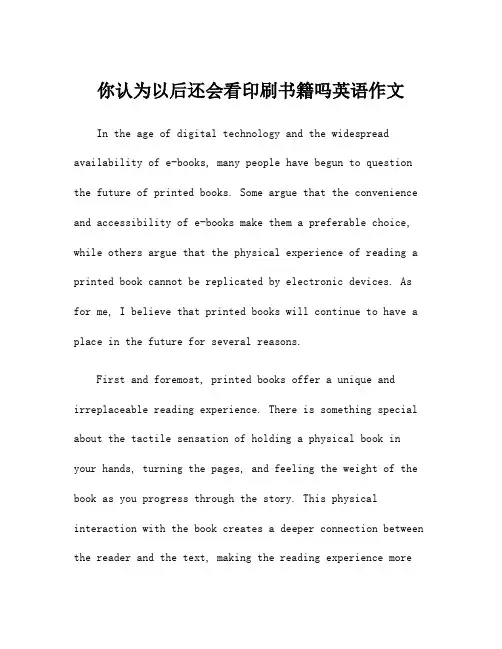
你认为以后还会看印刷书籍吗英语作文In the age of digital technology and the widespread availability of e-books, many people have begun to question the future of printed books. Some argue that the convenience and accessibility of e-books make them a preferable choice, while others argue that the physical experience of reading a printed book cannot be replicated by electronic devices. As for me, I believe that printed books will continue to have a place in the future for several reasons.First and foremost, printed books offer a unique and irreplaceable reading experience. There is something special about the tactile sensation of holding a physical book in your hands, turning the pages, and feeling the weight of the book as you progress through the story. This physical interaction with the book creates a deeper connection between the reader and the text, making the reading experience moreimmersive and memorable. Additionally, many people enjoy the visual and aesthetic appeal of printed books, including the cover art, typography, and design elements that contribute to the overall reading experience.Furthermore, printed books are often seen as a more reliable and enduring format for storing information. While digital devices and e-books are convenient, they are also vulnerable to technological malfunctions, data loss, and obsolescence. In contrast, printed books have a proven track record of durability and longevity, with many books lasting for decades or even centuries. This makes printed books a trusted source of knowledge and entertainment that can be passed down through generations.In addition, printed books play a significant role in the preservation of cultural heritage and tradition. Many classic works of literature, historical texts, and religious scriptures are primarily found in printed form, and thesephysical artifacts are essential for maintaining and celebrating our collective cultural history. Furthermore, printed books are often cherished as valuable keepsakes and collector's items, with many people placing sentimental value on specific editions or titles that hold personal significance.Moreover, the act of browsing and discovering books in a physical bookstore or library is an experience that cannot be fully replicated in the digital realm. The serendipity of stumbling upon an unexpected literary gem, the pleasure of flipping through pages to sample the writing style, and the social aspect of discussing books with fellow patrons are all part of the charm of physical bookstores and libraries. These experiences contribute to a sense of community and connection that enriches the reading culture.In conclusion, while e-books and digital technology have undeniably transformed the landscape of reading andpublishing, printed books will continue to have a place in the future due to their unique reading experience,reliability, cultural significance, and the social aspect of book browsing. The coexistence of both printed and digital formats offers readers a diverse range of options and ensures that the joy of reading will endure in various forms for generations to come.。
以future book为主题的英语作文
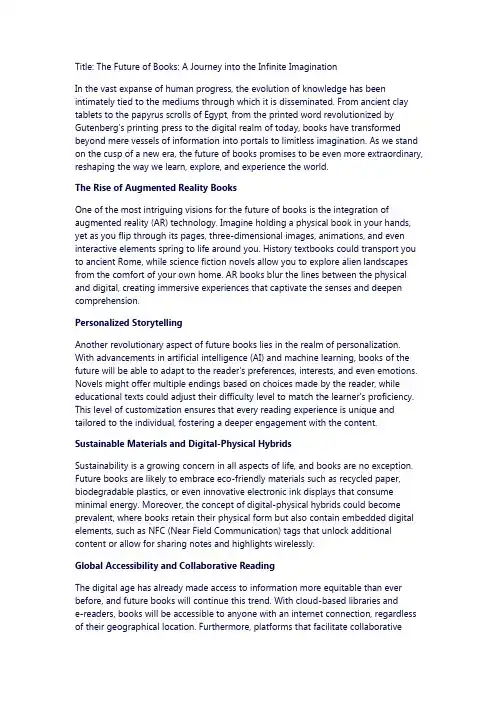
Title: The Future of Books: A Journey into the Infinite ImaginationIn the vast expanse of human progress, the evolution of knowledge has been intimately tied to the mediums through which it is disseminated. From ancient clay tablets to the papyrus scrolls of Egypt, from the printed word revolutionized by Gutenberg's printing press to the digital realm of today, books have transformed beyond mere vessels of information into portals to limitless imagination. As we stand on the cusp of a new era, the future of books promises to be even more extraordinary, reshaping the way we learn, explore, and experience the world.The Rise of Augmented Reality BooksOne of the most intriguing visions for the future of books is the integration of augmented reality (AR) technology. Imagine holding a physical book in your hands, yet as you flip through its pages, three-dimensional images, animations, and even interactive elements spring to life around you. History textbooks could transport you to ancient Rome, while science fiction novels allow you to explore alien landscapes from the comfort of your own home. AR books blur the lines between the physical and digital, creating immersive experiences that captivate the senses and deepen comprehension.Personalized StorytellingAnother revolutionary aspect of future books lies in the realm of personalization. With advancements in artificial intelligence (AI) and machine learning, books of the future will be able to adapt to the reader's preferences, interests, and even emotions. Novels might offer multiple endings based on choices made by the reader, while educational texts could adjust their difficulty level to match the learner's proficiency. This level of customization ensures that every reading experience is unique and tailored to the individual, fostering a deeper engagement with the content. Sustainable Materials and Digital-Physical HybridsSustainability is a growing concern in all aspects of life, and books are no exception. Future books are likely to embrace eco-friendly materials such as recycled paper, biodegradable plastics, or even innovative electronic ink displays that consume minimal energy. Moreover, the concept of digital-physical hybrids could become prevalent, where books retain their physical form but also contain embedded digital elements, such as NFC (Near Field Communication) tags that unlock additional content or allow for sharing notes and highlights wirelessly.Global Accessibility and Collaborative ReadingThe digital age has already made access to information more equitable than ever before, and future books will continue this trend. With cloud-based libraries ande-readers, books will be accessible to anyone with an internet connection, regardless of their geographical location. Furthermore, platforms that facilitate collaborativereading will encourage people from different parts of the world to engage in discussions, share interpretations, and even co-author stories, fostering a sense of global community and intellectual exchange.The Preservation of Cultural HeritageFinally, future books will play a pivotal role in preserving and revitalizing cultural heritage. By digitizing ancient manuscripts, oral traditions, and indigenous knowledge, these invaluable resources can be made accessible to wider audiences while also safeguarding them against the ravages of time. Additionally, interactive digital recreations of historical texts and artifacts will allow for immersive explorations, ensuring that future generations can appreciate and learn from the rich tapestry of human history.In conclusion, the future of books holds immense potential for innovation and transformation. From augmented reality experiences to personalized storytelling, from sustainable materials to global accessibility, the evolution of books will continue to shape our understanding of the world and foster connections across cultures and generations. As we embark on this exciting journey, let us embrace the boundless possibilities that lie ahead, for the future of books is truly a testament to the infinite imagination of humankind.。
作文未来的书籍不少于四百字左右
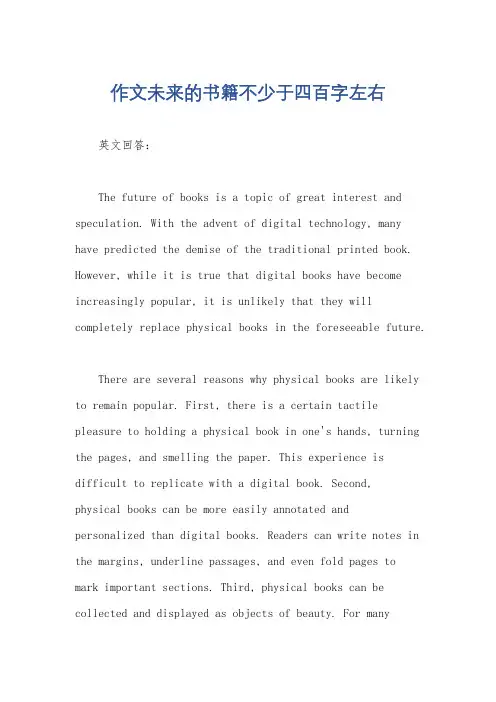
作文未来的书籍不少于四百字左右英文回答:The future of books is a topic of great interest and speculation. With the advent of digital technology, many have predicted the demise of the traditional printed book. However, while it is true that digital books have become increasingly popular, it is unlikely that they will completely replace physical books in the foreseeable future.There are several reasons why physical books are likely to remain popular. First, there is a certain tactile pleasure to holding a physical book in one's hands, turning the pages, and smelling the paper. This experience isdifficult to replicate with a digital book. Second,physical books can be more easily annotated andpersonalized than digital books. Readers can write notes in the margins, underline passages, and even fold pages tomark important sections. Third, physical books can be collected and displayed as objects of beauty. For manypeople, their book collection is a source of pride and joy.Of course, digital books also have their advantages. They are more portable than physical books, and they can be easily stored and organized on a computer or e-reader. Digital books are also often cheaper than physical books, and they can be purchased and downloaded instantly.Ultimately, the future of books is likely to be a hybrid one. Physical books will continue to be popular for their tactile qualities, their ease of annotation, andtheir aesthetic appeal. However, digital books will also continue to grow in popularity for their portability, their convenience, and their affordability.中文回答:书籍的未来是一个备受关注和猜测的话题。
未来书籍会怎么样TheFutureofthePrintedBooks英语作文
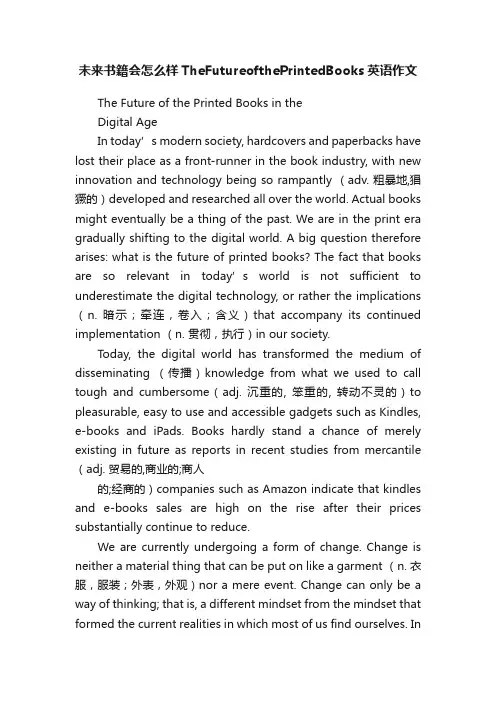
未来书籍会怎么样TheFutureofthePrintedBooks英语作文The Future of the Printed Books in theDigital AgeIn today’s modern society, hardcovers and paperbacks have lost their place as a front-runner in the book industry, with new innovation and technology being so rampantly (adv. 粗暴地,猖獗的)developed and researched all over the world. Actual books might eventually be a thing of the past. We are in the print era gradually shifting to the digital world. A big question therefore arises: what is the future of printed books? The fact that books are so relevant in today’s world is not sufficient to underestimate the digital technology, or rather the implications (n. 暗示;牵连,卷入;含义)that accompany its continued implementation (n. 贯彻,执行)in our society.Today, the digital world has transformed the medium of disseminating (传播)knowledge from what we used to call tough and cumbersome(adj. 沉重的, 笨重的, 转动不灵的)to pleasurable, easy to use and accessible gadgets such as Kindles, e-books and iPads. Books hardly stand a chance of merely existing in future as reports in recent studies from mercantile (adj. 贸易的,商业的;商人的;经商的)companies such as Amazon indicate that kindles and e-books sales are high on the rise after their prices substantially continue to reduce.We are currently undergoing a form of change. Change is neither a material thing that can be put on like a garment (n. 衣服,服装;外表,外观)nor a mere event. Change can only be a way of thinking; that is, a different mindset from the mindset that formed the current realities in which most of us find ourselves. Inthe sense that we cannot advance from our current position with the same level of thinking that got us there, there is need to figure out how to navigate to this new era.It is quite evident that books are surprisingly no longer the principle cultural media. This is because books are increasingly becoming relegated(vt. 把降低到;归入;提交)to a lower edge by the flashing screens, iPads,e-books, Kindles, tablets and other related electronic media. It is a common belief now that printed books and related media are doomed(adj. 注定的;命定的)and outdated technology. This significantly shows that the digital era has taken full control and it is a thing to bewelcomed with joy. The benefits of the digital era outweigh the print media. Digital books are easier to share information at a relatively cheap price and can be accessed all over the world to anyone with access to the internet. It is also advantageous in that information can be stored over a long time frame without wear and tear, hence the current trend of shifting to the digital age.Paperwork will not completely diminish in spite of dire predictions. It will survive but its place in the modern culture might significantly change. Although there is an outcry from scholars that printed books may become obsolete with new technology, this is heresy, according to Brian Goodman, a contributor at HuffPost, having written 100+ explanatory essays related to education and technology. He says that there are certain experiences that are found in a printed book considering the smell or even its feel, something that definitely cannot be found on mp3 or kindles. He, therefore, argues out that this is one main reason that will never see the death of a printed book.As the tussle(vi. 扭打;打斗;剧烈的斗争)between thedigital media and printed media continues, it is important to determine the strength and the weakness of each medium. By le arning this, it will help to determine their future. “Digital media has multimedia capabilities, it is shareable, has unlimited and near instant supply and even multiple input possibilities,” notes Kevin Johnston, Digital Marketing Director at ConfidentWriters. On the other hand, it lacks standardization and issues to do with portability(n. 可携带,轻便)not to mention the restrictions from booksellers. These qualities by far outdo printed sources and therefore the direction we are heading is clear.In the future, books have a minimal chance of surviving. Electronic media are quickly replacing the printed media and within a little time, books will be of little use in our society. Printed media will definitely struggle to exist, but they will eventually become phased out by the digital age within no time. Though books remain to be part of our history, they have no future in this digital age.。
你认为人们将来还会印发书籍6吗的英语作文
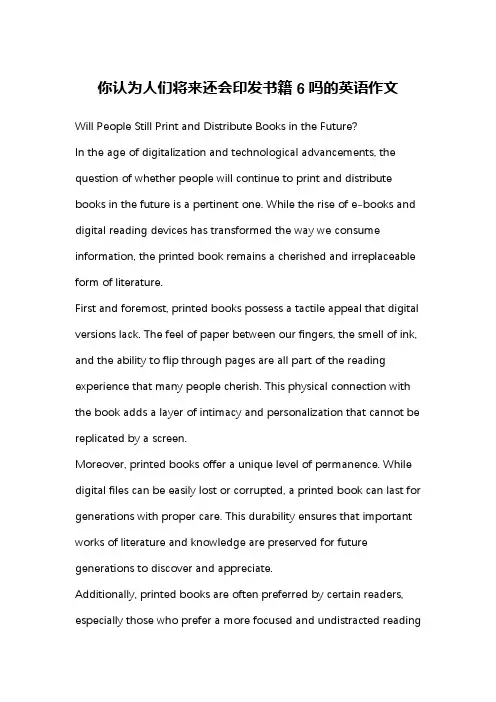
你认为人们将来还会印发书籍6吗的英语作文Will People Still Print and Distribute Books in the Future?In the age of digitalization and technological advancements, the question of whether people will continue to print and distribute books in the future is a pertinent one. While the rise of e-books and digital reading devices has transformed the way we consume information, the printed book remains a cherished and irreplaceable form of literature.First and foremost, printed books possess a tactile appeal that digital versions lack. The feel of paper between our fingers, the smell of ink, and the ability to flip through pages are all part of the reading experience that many people cherish. This physical connection with the book adds a layer of intimacy and personalization that cannot be replicated by a screen.Moreover, printed books offer a unique level of permanence. While digital files can be easily lost or corrupted, a printed book can last for generations with proper care. This durability ensures that important works of literature and knowledge are preserved for future generations to discover and appreciate.Additionally, printed books are often preferred by certain readers, especially those who prefer a more focused and undistracted readingenvironment. Without the temptation of notifications, social media, or other distractions that often accompany digital devices, printed books allow for a deeper and more immersive reading experience. However, it is also worth acknowledging that digital books have their own advantages. They are easily accessible and convenient, often cheaper, and offer a wider range of content than physical bookstores. Moreover, they are environmentally friendly as they eliminate the need for paper and ink, reducing waste and carbon emissions.In conclusion, while the future of book printing and distribution remains uncertain, it is likely that printed books will continue to coexist with digital versions. Each format offers its own unique benefits and appeal, catering to different reading preferences and needs. Whether we choose to read from a physical book or a digital device, the essence of reading and the joy it brings will remain unchanged.。
未来的书籍的作文四百字
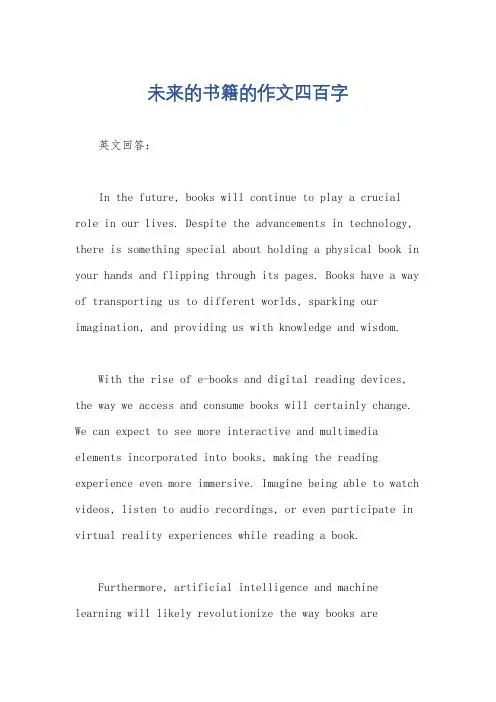
未来的书籍的作文四百字英文回答:In the future, books will continue to play a crucial role in our lives. Despite the advancements in technology, there is something special about holding a physical book in your hands and flipping through its pages. Books have a way of transporting us to different worlds, sparking our imagination, and providing us with knowledge and wisdom.With the rise of e-books and digital reading devices, the way we access and consume books will certainly change. We can expect to see more interactive and multimedia elements incorporated into books, making the reading experience even more immersive. Imagine being able to watch videos, listen to audio recordings, or even participate in virtual reality experiences while reading a book.Furthermore, artificial intelligence and machine learning will likely revolutionize the way books arewritten and consumed. AI algorithms could assist authors in generating ideas, improving their writing, and even predicting the success of a book. Readers may also benefit from personalized recommendations based on their reading preferences and behavior.However, despite these advancements, I believe that traditional printed books will never go out of style. There is something nostalgic and comforting about the smell of the pages, the weight of a book in your hands, and the ability to physically mark your progress. Books also serve as a form of self-expression, with many people proudly displaying their collections as a reflection of their interests and personality.中文回答:未来,书籍仍将在我们的生活中起着至关重要的作用。
实用英语综合教程-U1-TextA资料
Text-related Information
Stephen King:
An American author of contemporary horror, suspense, science fiction and fantasy. His books have sold more than 350 million copies and have been adapted into a number of feature films, television movies and comic books. King has published 50 novels, including seven under the pen-name of Richard Bachman, and five non-fiction books. He has written nearly two hundred short stories, most of which have been collected in nine collections of short fiction. Many of his stories are set in his home state of Maine.
e-books? Why or why not?
Now compare your answers with those of your neighbours’.
Back
Pre-Reading Task Exercise 1 (Suggested Answers)
1. There are a lot of advantages of e-books over printed books. For example, unlike printed books, e-books take up less space. You practically don’t need any space to store them. You don’t need a library or a room for them. You can store hundreds and thousands of e-books on your computer or reading device. Secondly, e-books are portable. You can carry a whole library of hundreds of books with you, on CD, in a laptop, notebook or
关于printed book的英语作文
关于printed book的英语作文The printed book has been a staple of human civilization for centuries, serving as a means of recording and disseminating information, ideas, and stories. Despite the rise of digital technology and e-books in recent years, printed books continue to hold a special place in the hearts of readers around the world.Printed books offer a tactile and sensory experience that cannot be replicated by digital devices. The weight of the paper, the smell of the ink, the feel of the pages between your fingers –all of these elements contribute to the overall reading experience and create a sense of connection with the text. Many readers also appreciate the physicality of printed books, enjoying the act of turning pages and seeing their progress through the story.In addition to their sensory appeal, printed books also have practical advantages over e-books. They do not require batteries or electronic devices to function, making them a reliable and accessible source of information. Printed books are also durable and long-lasting, able to withstand wear and tear over time. Many readers prefer the permanence and tangibility of a printed book over the transient nature of digital texts.Furthermore, printed books play an important role in preserving cultural heritage and literary traditions. Many classic works of literature are only available in printed form, and libraries and archives around the world house rare and valuable collections of printed books. These physical artifacts provide a tangible link to the past and offer insights into the thoughts and experiences of generations gone by.Despite the enduring appeal of printed books, the publishing industry has seen a shift towards digital formats in recent years. E-books offer convenience and portability, allowing readers to carry hundreds of books in a single device. They also provide new opportunities for interactive and multimedia content, enhancing the reading experience in ways that printed books cannot.However, while e-books have their advantages, they cannot replace the unique qualities of printed books. The tactile experience, the sense of connection, and the cultural significance of printed books all contribute to their enduring popularity. As technology continues to evolve, printed books will likely continue to coexist alongside digital formats, offering readers a choice in how they access and engage with written content.In conclusion, the printed book remains a cherished and valuable form of communication and expression in the digital age. Its sensory appeal, practical advantages, and cultural significance ensure that it will continue to hold a special place in the hearts of readers for generations to come. As we look to the future of publishing, it is important to recognize and appreciate the enduring legacy of the printed book.。
写一篇关于东西在未来消失的作文英语
写一篇关于东西在未来消失的作文英语In the future, it is possible that many things we currently take for granted will disappear. This could be due to a variety of reasons, such as technological advancements, environmental changes, or shifts in societal values. Let's explore some of the things that could potentially disappear in the future.1. Printed BooksWith the rise of e-books and digital reading devices, the demand for printed books has been declining. In the future, it is possible that printed books may become obsolete as more and more people opt for digital versions. While some may argue that printed books will never completely disappear due to their sentimental value and the tactile experience they provide, it is undeniable thattheir prevalence is likely to decrease.2. Physical CurrencyAs digital payment methods become increasingly popular, the use of physical currency may diminish. With the convenience of mobile payment apps and contactless paymenttechnology, carrying cash may become unnecessary. While physical currency may not completely disappear, its usage could significantly decline in the future.3. Landline TelephonesAs more and more people rely on mobile phones for communication, landline telephones may become obsolete. With the convenience of mobile phones and the ability to stay connected on the go, the need for landline telephones is diminishing. In the future, it is possible that landline telephones will no longer be a common household item.4. Traditional TelevisionWith the rise of streaming services and on-demand content, traditional television may become less relevant. Many people are now opting for subscription-based streaming platforms that offer a wide range of content without the need for scheduled programming. In the future, traditional television channels may struggle to compete with the convenience and variety offered by streaming services.5. Fossil FuelsAs the world shifts towards renewable energy sources, the use of fossil fuels may decline. With the focus on sustainability and reducing carbon emissions, there is a growing movement towards alternative energy sources such as solar, wind, and hydroelectric power. In the future, it is possible that fossil fuels will be phased out in favor of cleaner and more sustainable options.6. Physical KeysWith the advancement of smart lock technology and biometric security systems, traditional physical keys may become less common. Smart locks that can be operated via smartphones or key fobs are gaining popularity, offering convenience and enhanced security. In the future, it is possible that physical keys may be replaced by more advanced and digital access control methods.7. Traditional Retail StoresAs online shopping continues to grow in popularity, traditional retail stores may face challenges. The convenience of shopping online, along with the ability to access a wide range of products and compare prices easily, has led to a shift in consumer behavior. In the future, itis possible that brick-and-mortar stores may struggle to compete with the convenience and accessibility of online retailers.8. Paper ReceiptsWith the increasing focus on sustainability and digital record-keeping, paper receipts may become a thing of the past. Many businesses are now offering digital receipts as an alternative to paper, reducing waste and streamlining record-keeping processes. In the future, it is possiblethat paper receipts may be replaced by electronic records entirely.9. Traditional MailAs digital communication methods continue to evolve, the use of traditional mail may decline. With the prevalence of email, messaging apps, and online document sharing, physical mail may become less necessary. While traditional mail may not disappear entirely, its usage could decrease significantly in the future.10. Single-Use PlasticsAs the world becomes more aware of the environmental impact of single-use plastics, there is a growing movement towards reducing their usage. With the implementation of plastic bans and the development of alternative packaging materials, the demand for single-use plastics may decreasein the future. In the future, it is possible that single-use plastics will be replaced by more sustainable and eco-friendly alternatives.These are just a few examples of things that could potentially disappear in the future. While some of these changes may be inevitable due to technological advancements and societal shifts, it is important to consider the potential implications and prepare for a future where these things may no longer be a part of everyday life.未来,许多我们现在认为理所当然的东西可能会消失。
阅读理解之议论文
大多以“总—分—总”的结构行文,即“提出问题—分 结构
析问题—解决问题”。 议论文一般观点明确、论据充分、语言精练、论证合理, 语言 有严密的逻辑性。 议论文难度相对比较大,命题角度呈多样化,如细节理 命题 解题、推理判断题、主旨大意题等。
返回
解题策略
高考英语议论文设题广泛,细节理解题、推理判断题、词句猜 测题、主旨大意题都有可能出现,因此,在阅读议论文时,应该从 结构和内容两方面同时入手,先通读原文,再区分事实和观点,明 确论点、论证和论据,明了作者最后得出的结论。具体答题策略如下:
Things are connected.Let your expertise in one field fuel your passions in all related areas.Some of your interests may not appear to be connected but,once you explore their depths,you discover that they are.My editor Toni,who is also a writer,has edited several history books.She has decided to study Chinese history.Fascinated by the structural beauty of the Forbidden City as a painter,she is equally interested to learn more about Chinese philosophy.“I don’t know where it will lead,but I’m excited I’m on this pursuit.”
- 1、下载文档前请自行甄别文档内容的完整性,平台不提供额外的编辑、内容补充、找答案等附加服务。
- 2、"仅部分预览"的文档,不可在线预览部分如存在完整性等问题,可反馈申请退款(可完整预览的文档不适用该条件!)。
- 3、如文档侵犯您的权益,请联系客服反馈,我们会尽快为您处理(人工客服工作时间:9:00-18:30)。
The Future of the Printed Books in the
Digital Age
In today’s modern society, hardcovers and paperbacks have lost their place as a front-runner in the book industry, with new innovation and technology being so rampantly (adv. 粗暴地,猖獗的)developed and researched all over the world. Actual books might eventually be a thing of the past. We are in the print era gradually shifting to the digital world. A big question therefore arises: what is the future of printed books? The fact that books are so relevant in today’s world is not sufficient to underestimate the digital technology, or rather the implications(n. 暗示;牵连,卷入;含义)that accompany its continued implementation (n. 贯彻,执行)in our society.
Today, the digital world has transformed the medium of disseminating (传播)knowledge from what we used to call tough and cumbersome(adj. 沉重的, 笨重的, 转动不灵的)to pleasurable, easy to use and accessible gadgets such as Kindles, e-books and iPads. Books hardly stand a chance of merely existing in future as reports in recent studies from mercantile(adj. 贸易的,商业的;商人
的;经商的)companies such as Amazon indicate that kindles and e-books sales are high on the rise after their prices substantially continue to reduce.
We are currently undergoing a form of change. Change is neither a material thing that can be put on like a garment (n. 衣服,服装;外表,外观)nor a mere event. Change can only be a way of thinking; that is, a different mindset from the mindset that formed the current realities in which most of us find ourselves. In the sense that we cannot advance from our current position with the same level of thinking that got us there, there is need to figure out how to navigate to this new era.
It is quite evident that books are surprisingly no longer the principle cultural media. This is because books are increasingly becoming relegated(vt. 把降低到;归入;提交)to a lower edge by the flashing screens, iPads,
e-books, Kindles, tablets and other related electronic media. It is a common belief now that printed books and related media are doomed(adj. 注定的;命定的)and outdated technology. This significantly shows that the digital era has taken full control and it is a thing to be
welcomed with joy. The benefits of the digital era outweigh the print media. Digital books are easier to share information at a relatively cheap price and can be accessed all over the world to anyone with access to the internet. It is also advantageous in that information can be stored over a long time frame without wear and tear, hence the current trend of shifting to the digital age.
Paperwork will not completely diminish in spite of dire predictions. It will survive but its place in the modern culture might significantly change. Although there is an outcry from scholars that printed books may become obsolete with new technology, this is heresy, according to Brian Goodman, a contributor at HuffPost, having written 100+ explanatory essays related to education and technology. He says that there are certain experiences that are found in a printed book considering the smell or even its feel, something that definitely cannot be found on mp3 or kindles. He, therefore, argues out that this is one main reason that will never see the death of a printed book.
As the tussle(vi. 扭打;打斗;剧烈的斗争)between the digital media and printed media continues, it is important to
determine the strength and the weakness of each medium. By learning this, it will help to determine their future. “Digital media has multimedia capabilities, it is shareable, has unlimited and near instant supply and even multiple input possibilities,” notes Kevin Johnston, Digital Marketing Director at ConfidentWriters. On the other hand, it lacks standardization and issues to do with portability(n. 可携带,轻便)not to mention the restrictions from booksellers. These qualities by far outdo printed sources and therefore the direction we are heading is clear.
In the future, books have a minimal chance of surviving. Electronic media are quickly replacing the printed media and within a little time, books will be of little use in our society. Printed media will definitely struggle to exist, but they will eventually become phased out by the digital age within no time. Though books remain to be part of our history, they have no future in this digital age.。
